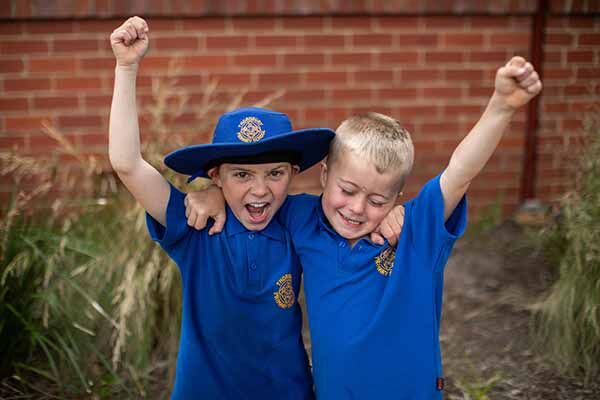Overview
Alignment with Be You Domains
-
Learning Resilience
Alignment with Australian Curriculum
- Health and PE
- Humanities and Social Sciences
Target audience
- Primary school
Target groups
- Individual
- Small group
- Whole class
- Whole school
Aims
FRIENDS for Life aims to build resilience and improve children’s confidence in overcoming challenges by normalising their experiences of anxiety and worries.Program theory
The FRIENDS for Life program teaches specific skills and techniques based on the five aspects of the theoretical model for the Prevention and Early Intervention of Anxiety. These are the nature of attachment (emotions), physiological (body), cognitive (mind), and learning (behaviour) processes that interact in the development, experience, and maintenance of anxiety. Program activities are based on experiential learning and peer learning models.Topics
Topics covered include: all feelings are OK, understanding and managing feelings, paying attention to other people’s feelings, focusing on body clues, breathing exercises, changing ‘red’ thoughts to ‘green’ thoughts, identifying role models and support teams, learning coping step plan, learning about finding solutions and giving back to the community.Cost
Program structure
The program usually requires 12 sessions of 1 hour each. It is recommended that the first 10 sessions occur weekly and the following booster sessions occur a month apart. However, there is a great deal of flexibility to suit each group's needs. The duration of each session and the total number of sessions can be modified without impacting the program's efficiency. Games and activities recommended in the training videos and manuals can also be replaced with similar activities that promote greater engagement in the group. Facilitators may choose additional resources that complement the program content from the Friends Resilience Hub and our website.Instructor
- External facilitator
- Psychologist
- Educator
- Wellbeing leader
Instructor training
Educators are required to complete up to 12 hours of online training to deliver this program. Educators will be certified for three years once they complete the training. To ensure the quality of program delivery, teachers have to complete refresher training every 3 years. Face-to-face training is also available if requested.Supporting resources or materials available with program
- Manual
- Online webinars
Ongoing support
Ongoing phone contact and email support about program delivery, content and additional resources are available. Support is provided as requested.Parent involvement
- Attend information sessions
- Parent handbook
- Online resources
Origin of program
Australia
Friends Resilience
Program authors
Dr Paula Barrett
- PO Box 5699,West End QLD 4101 Australia
Ratings
Summary of evidence factors
This is a summary of the evaluation or research study characteristics that contribute to the program’s evidence rating.
|
Positive impact on at least one outcome for children and/or young people?
The study reported positive outcomes. |
Yes |
|---|---|
|
Link between program description and theory of change
Theory of change refers to whether there was a comprehensive description and illustration of how and why a desired change is expected to happen in a particular context. |
Comprehensive |
|
Study design
Type of study design reported. |
Randomised control trial |
|
Independence
The degree to which the program authors were involved in the research. |
Completely |
Summary of implementation factors
This is a summary of the program’s characteristics that contribute to its implementation rating.
|
Feedback sought from participants
Participants enjoyed the program and understood its benefits. |
Yes |
|---|---|
|
Feedback sought from instructors
Instructors enjoyed the program and understood its benefits. |
Yes |
|
Groups program is not suitable for
Groups the program wouldn't be suitable for or that required further research to determine suitability. |
Not assessed |
|
Training provided during study
The model of training provided. |
Face to face, all instructors, in person |
|
Ongoing instructor support provided during study
Whether ongoing support is provided. |
Yes |
Context
This is a summary of the context in which the evidence for the program was established.
|
Study Participants
Pre school, primary school (Foundation to Year 6), secondary school (Years 7 to 12). |
Primary school Secondary school |
|---|---|
|
Country of Study/s
The location in which the evidence or research was conducted. |
Australia |
|
Location of Study/s in Australia
The state (or states) the program was assessed in Australia. |
QLD |
|
Evaluation of program in culturally and linguistically diverse populations
Provider has included culturally and linguistically diverse people when assessing the program. |
No |
|
Evaluation of program in Aboriginal and Torres Strait Islander children and young people
Provider has included Aboriginal and Torres Strait Islander peoples when assessing the program. |
Yes |
|
Evaluation of program in low socioeconomic groups
Program has evaluated a diverse socio-economic population in their research. |
Yes |
|
Developmental based adaptations to program design and delivery
Shorter sessions for younger students or activities are adjusted for age appropriateness. |
No |
|
Evaluation of program in children and young people with disability and/or learning difference
Provider has included participants with a disability or learning difference when assessing the program. |
No |
Last updated: 13 February 2023
